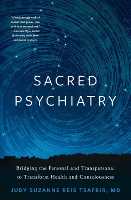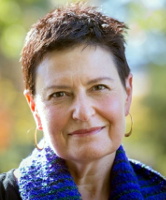
In this Article:
- How does the mindset of patriarchy contribute to societal separation?
- Why is the concept of “normal” in modern society a myth?
- How can spiritual practices help overcome suffering and disconnection?
- What role does healing from patriarchal structures play in well-being?
- How to cultivate a meaningful spiritual life and connection to the sacred.
The Myth of Normal: The Mindset of Patriarchy and Separation
by Judy Suzanne Reis Tsafrir, MD.
One only sees what one looks for;
one only looks for what one knows.
— Johann Wolfgang von Goethe
One of the foundational values put forth by the United States constitution is the separation of church and state, which was intended to guarantee religious freedom, allowing citizens to worship according to their own traditions and faith. Unfortunately, this mindset of separation has resulted in a mainstream culture that not only ignores and denies the presence and role of the sacred in our ordinary lives but also is, frankly, allergic to it, and the separation is at the heart of much of the suffering of my patients.
Without a sense of themselves as spiritual beings, many feel alone, separate and finite, a body and a brain with a particular personal history that began at birth and will end when they die. They have no sense that they came here endowed with a heavenly mandate regarding their life purpose in this incarnation, that their consciousness will persist after the death of their physical body, and, equally important, that they are a part of and belong to the larger whole of the natural world and the cosmos.
Accessing the Sacred Dimension of Ourselves and the World
This materialist secular modern worldview often results in experiences of existential dread, alienation, and hopelessness. Many do not have access to the sacred dimension of themselves or of the world around them and thus feel confined only to experiences of the world that can be apprehended with the five senses, rather than known through their intuition and heart.
Msny have no practices, no familiarity with rituals or ceremonies that ground them and increase their sense of presence and attune them to a context larger than themselves, which provides a sense of magic, meaning, interconnectedness, and spaciousness. Without a sense of the sacred, they often feel depressed, anxious, and fearful as they slog through the dailiness of their lives, endure the inevitable changes, losses, and su"ering associated with aging, sickness, and death.
The Mindset of Patriarchy and Separation
This experience has been particularly heightened in the face of the massive planetary transformation that has been underway since 2008, when Pluto moved into Capricorn, and the collapse and transformation of long-standing hierarchical structures associated with the patriarchy began to accelerate.
The limiting mindset that is the prevailing paradigm of our culture is that if it cannot be scientifically proven, then it is not real. This mindset of separation is at the heart of the abuse, cruelty, and disrespect that we show each other and the natural world. There is a blindness to the reality that everything is connected and that, when we harm one another and behave in ways that are destructive to nature, we are simultaneously harming ourselves.
4 Questions to Nurture Your Spiritual Life
A few years ago, in a talk at the 92nd Street Y in New York City, Rabbi Naomi Levy, author of a book entitled Einstein and the Rabbi, which is about reclaiming the soul, commented on the common practice of taking selfies in front of a gorgeous vista, where the self is featured large and the vista very much in the background. This focus upon the presentation and display of self is not a prescription for happiness.
She recommended instead that we take a “soul-fie,” which involves internally posing four questions daily:
- What has my soul been trying to say to me that I have been ignoring?
- What activities nourish my soul that I do not do enough of?
- What does my soul want to repair that my ego or vanity is too stubborn or fearful to repair?
- What does my soul want me to reach for?
These are profound questions that connect one to one’s essence, the sacred aspect of the self. The rabbi commented that, when you listen to your soul, you are bold, and it does not matter whether others think that you are foolish or insane. You live in a way that feels true to your heart and that fosters a feeling of wholeness, alignment, and well-being.
The Myth of Normal
In his recent book The Myth of Normal, Gabor Maté, a Hungarian psychiatrist, author, and survivor of the Holocaust, described how we think of the concept of “normal” as healthy and natural but said that many conditions that we have become used to in modern society are normal insofar as they represent the average, but in reality, our culture has become so divorced from the actual needs of human beings that normality is a myth.
When Adolf Eichmann, the Nazi engineer of the genocide, was examined by a group of psychiatrists, he was found to be perfectly “normal” in terms of his relationship with his wife, children, parents, siblings, and friends. Dr. Maté made the point that, globally, the most reprehensible and hideous acts are committed by people who are considered perfectly “normal” in their societies.
He cited the work of psychologist Abraham Maslow, who found that individuals who were healthier had a much more complex relationship with their less healthy culture and chose authenticity over fitting in. In our society, it is perfectly normal to be driven by consumerism, to be divorced from the natural world, to have a diet and lifestyle that promotes chronic illness, and to have no spiritual practice whatsoever.
Reinstating Spiritual Practice
When I meet a new patient, I always inquire about the spiritual dimension of their life. Very commonly, they grew up in families with no spiritual practice whatsoever, and they have absolutely no idea what it means to have a spiritually engaged life.
Sometimes, they went to Catholic school and were obliged to attend Mass regularly, but it was a guilt-provoking, repressive experience, which they were only too glad to distance themselves from when they were free to do so. Their relationship to Catholicism only became more aversive and fraught as the revelations of widespread abuse of children by priests has become public and ubiquitous.
Some patients were raised in homes that were culturally Jewish but had no connection with any sacred dimension of the tradition. Some were obliged to go to Hebrew school and to have a bar or bat mitzvah, but it felt empty and alienating and like they were going through the motions, rather than having an experience of a deeply meaningful developmental rite of passage in the context of the sacred community.
It is the rare patient in my practice who reports a rich spiritual experience in the family growing up, and many come to me with no personal practice as adults whatsoever. Some may meditate, but it’s done with the goal of reaping the health benefits of relaxing the nervous system rather than as a practice that enhances consciousness, which can foster transcendence of the sense of the self as separate and enhance an awareness of the interconnectedness of all beings.
Cultivating the Spiritual Aspect of Healing
It can safely be assumed that the patients who I see are a self-selected group who are drawn to me because they are aware that cultivating the spiritual aspect of healing is central to my approach. When I ask a new patient whether they would be interested in having a more developed spiritual life, the answer is almost always yes. They have no idea about how to implement a spiritual practice but are very open and even hungry for guidance.
In addition to ordering diagnostic tests and making recommendations for nutrition, sleep, movement, sunlight, and other lifestyle changes, my treatment plan always includes recommendations for ideas to create and cultivate a spiritual practice, if there is a desire for that. As our old world undergoes a rapid and thorough transformation, it becomes less and less possible to rely on external reality as a source of security. In order to remain resilient, it has become ever more essential to cultivate our inner psychospiritual resources.
Copyright 2024. All Rights Reserved.
Adapted with permission.
Article Source:
BOOK: Sacred Psychiatry
Sacred Psychiatry: Bridging the Personal and Transpersonal to Transform Health and Consciousness
by Judy Suzanne Reis Tsafrir MD.
 In Sacred Psychiatry, you will be introduced to a diverse range of holistic approaches to healing. This book offers invaluable guidance on how to develop a personal spiritual practice and highlights the profound significance of fulfilling the soul’s purpose. It illustrates the usefulness of astrology, emphasizes how toxic relationships undermine healing, and showcases the remarkable healing power of food as medicine.
In Sacred Psychiatry, you will be introduced to a diverse range of holistic approaches to healing. This book offers invaluable guidance on how to develop a personal spiritual practice and highlights the profound significance of fulfilling the soul’s purpose. It illustrates the usefulness of astrology, emphasizes how toxic relationships undermine healing, and showcases the remarkable healing power of food as medicine.
Sacred Psychiatry also provides a holistic framework for weaning off of psychiatric pharmaceuticals and highlights treatable but frequently overlooked complex chronic conditions such as mold toxicity, mast cell activation syndrome, and Ehlers-Danlos syndrome.
For more info and/or to order this hardback book, click here. Also available as a Kindle edition and as an Audiobook.
About the Author
 Judy Suzanne Reis Tsafrir, MD, is a holistic healer, activist, artist, and gardener with a private practice of holistic psychiatry and psychoanalysis located in Newton, Massachusetts. She is a board-certi#ed adult and child psychiatrist and psychoanalyst, is on the faculty of Harvard Medical School and the Boston Psychoanalytic Institute and teaches and supervises at the Cambridge Health Alliance. She has particular interest in combining spiritual and developmental approaches to healing, helping patients wean from psychiatric medications, and treating complex chronic medical conditions that present psychiatrically, including mold toxicity, mast cell activation, and Ehlers–Danlos Syndrome.
Judy Suzanne Reis Tsafrir, MD, is a holistic healer, activist, artist, and gardener with a private practice of holistic psychiatry and psychoanalysis located in Newton, Massachusetts. She is a board-certi#ed adult and child psychiatrist and psychoanalyst, is on the faculty of Harvard Medical School and the Boston Psychoanalytic Institute and teaches and supervises at the Cambridge Health Alliance. She has particular interest in combining spiritual and developmental approaches to healing, helping patients wean from psychiatric medications, and treating complex chronic medical conditions that present psychiatrically, including mold toxicity, mast cell activation, and Ehlers–Danlos Syndrome.
Judy is a practitioner of a variety of energy healing and esoteric modalities and her practice is dedicated to healing through the integration of heart, mind, body, soul, the biosphere, and the cosmos. Visit her website at JudyTsafrirMD.com
Article Recap:
This article explores how the mindset of patriarchy and the concept of "normal" contribute to feelings of separation, disconnection, and suffering. The author emphasizes that spiritual practice can help overcome these issues by fostering a deeper connection to oneself, the sacred, and the natural world. The article encourages readers to examine societal norms, develop personal rituals, and nurture inner resources for healing.




























